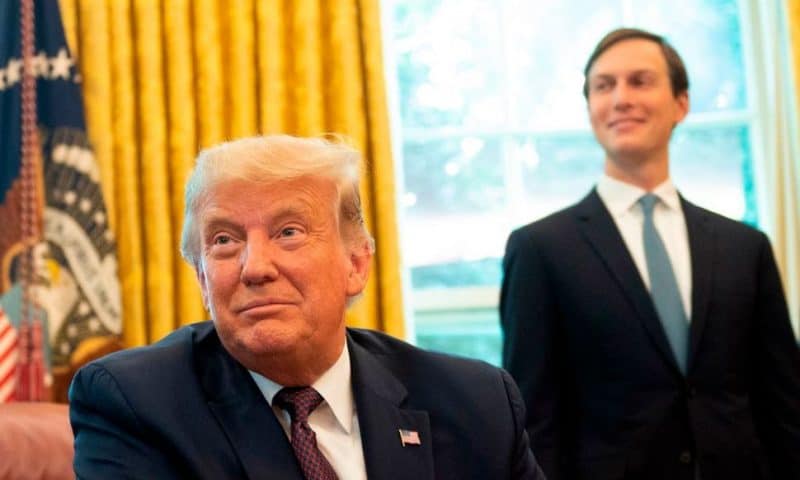‘I think it’s inevitable that all countries in the Middle East will normalize relations with Israel,’ White House senior adviser Jared Kushner said.
PRESIDENT DONALD TRUMP announced Friday that Israel and Bahrain would normalize diplomatic relations – the fourth Arab country ever to do so and the second within weeks – in a move seen as undermining the Palestinian cause but which the White House believes will ultimately lead to similar agreements throughout the Middle East.
“Another HISTORIC breakthrough today!” Trump tweeted Friday afternoon, along with a statement about the new pact. “Our two GREAT friends Israel and the Kingdom of Bahrain agree to a Peace Deal – the second Arab country to make peace with Israel in 30 days!”
White House officials were scant on details about what prompted the agreement to take place or any conditions governing it, particularly amid speculation that the U.S. may now consider more sophisticated arms sales to Bahrain as an incentive for warming relations with the Jewish state – a cornerstone of Trump’s foreign policy campaign promises. Bahrain hosts the home port for the U.S. Navy’s 5th Fleet and serves as a critical hub for U.S. operations throughout the region but is not, for example, among the countries approved to buy the sophisticated F-35 fighter jet.
Jared Kushner, Trump’s son-in-law and a senior adviser, attributed the agreement to “the culmination of four years of great work [that] the president and this administration has carefully executed” and offered surprising optimism about what it might portend.
“I think it’s inevitable that all countries in the Middle East will normalize relations with Israel,” Kushner told reporters shortly after Trump’s announcement.
The news came just less than a month after the U.S. announced Israel would normalize relations with the United Arab Emirates, also a key military partner of America’s in the Middle East. Confusion arose almost immediately about the conditions for that deal, to be known as the Abraham Accords, with Emirati leaders touting what they understood to be a permanent freeze on new Israeli settlements in the contested West Bank, while Israel considered the stipulation a temporary measure.
Tensions spiked weeks later when the UAE reportedly canceled a meeting with Israel and the U.S. due to a disagreement about the Arab nation’s desire to purchase F-35s, Axios reported at the time.
Countries that have warmed relations with Israel have also faced blowback for the appearance they are chipping away at Arab solidarity with the Palestinian people. An unnamed Palestinian official slammed the UAE peace deal shortly after news of it emerged, saying it rewards existing Isareli occupation of contested territory. A spokesman for the Palestinian militant political group Hamas accused the UAE of “stabbing” Palestinians in the back after agreeing to the deal.
Bahraini officials have accepted the White House’s invitation to attend the signing ceremony between Israel and the UAE to take place next week, according to the statement Trump shared.
Some foreign policy experts see the latest agreements as a signal of shifting realities, alliances and security threats in the region – not leadership from the Trump administration.
“It is unlikely that this deal, combined with the one between Israel and the United Arab Emirates, will fundamentally shift the overall instability in the Middle East,” Brian Katulis, senior fellow at the left-leaning Center for American Progress, said in an emailed statement. “These deals do nothing to de-escalate tensions with Iran, and it does not appear to produce any progress on resolving the Israeli-Palestinian conflict.”

